Let’s start with the big question: What is humanism? There are many different ways to tackle the question, but we wanted to introduce one response that we’ve found to be particularly effective in supporting young people’s learning (and retention). If you haven’t seen it yet, our recently launched animation Human nature, human potential provides a helpful introduction to this approach.
Sometimes, people begin by defining humanists in a negative way: ‘They don’t believe in a god,’ ‘They don’t believe in an afterlife,’ ‘They don’t believe our lives are part of a grand cosmic plan or purpose.’ It’s really important that we are able to describe humanists and humanism in a more positive and constructive manner, focusing on the things that humanists do believe in, not just the things they don’t. One way to do this is to begin by exploring a humanist understanding of human beings.
Young people often spot the word ‘human’ inside ‘humanism’ and ask why it is there. This can open up the opportunity to explore several questions at the heart of humanism: what are we, what are we capable of, and how can we make the best use of those capacities? Humanism is an approach to life that depends on our human capabilities and believes we can source answers to questions about knowledge, meaning, and value inside the human, and wider, natural world, without the need to appeal to anything beyond it. Exploring the ways that humanists understand our human origins, nature, and potential can help support a better understanding of the beliefs and motivations that lie behind a humanist approach to life.
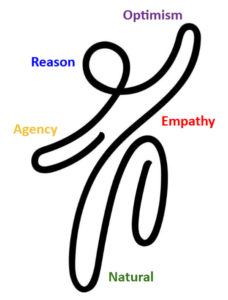
One way to illustrate this approach is to start with an image of a human being (I’m using the Happy Human found in Humanists UK’s logo). It provides a helpful visual hook on which we can hang some of the core features of humanism and tie them together (these also conveniently closely match the core areas of knowledge in the Understanding Humanism resources).
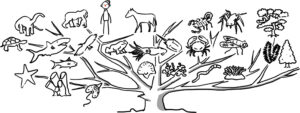
Question: What are we and where do we find ourselves?
Let’s start with the feet. It could be said that humanists try to keep at least one foot firmly on the ground – in connection with the natural world. A humanist understanding of the situation in which we find ourselves is one that sees the world as a natural place with no supernatural side, and believes science provides the best explanation of our origins. Human beings are a product of nature and what we are made from will return to the natural world after we are gone. We are material and mortal creatures. This is the one life we have.
‘We are part of this natural universe and this natural world. We are part of the story of life on this planet. We can feel a real sense of belonging and connectedness in this story, and also a humility in the face of all the contingencies and chances that led to the survival of our species.’
Alice Roberts, anatomist, broadcaster, and Vice-president of Humanists UK
Some people worry that this presents a somewhat cold and pessimistic understanding of human beings. However, for humanists, wonder can be found in the scientific story (for example, the atoms in our bodies were formed inside the hearts of stars). Humanists also combine this scientific understanding with a cautiously optimistic understanding of our human potential. We have naturally evolved particular capacities that can support us to answer questions, to consider and care for others, and to lead full and flourishing lives. Let’s take a look at some of those capabilities.
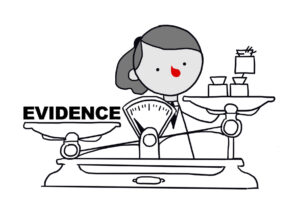
Question: How can we know what is true?
We are curious. We can ask questions and, in seeking answers, we are capable of using reason – thinking clearly, logically, and critically about our own beliefs and about the claims of others. This has enabled us to develop the scientific, evidence-based approach to understanding, which has provided us with the most reliable way to answer questions about the world, to make progress in our knowledge, and to share in this collaborative endeavour. Humanists believe this approach gives our beliefs the best chance of being true.
‘The scientific method… can be summarised in one sentence: Do whatever it takes to avoid fooling yourself into thinking something is true that is not.’
Neil Degrasse Tyson, astrophysicist
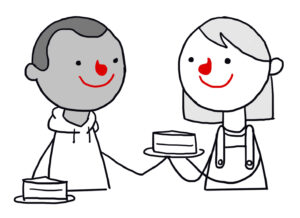
Question: How do we know what is good?
We have evolved the capacity to empathise with others, to imaginatively identify with them, and to consider the potential consequences of our actions upon them. We can recognise that, despite our differences, human beings have many shared needs, feelings, and values. These can help open up conversation about moral questions, reveal why some answers are better than others, and enable us to consider how we should treat others. Empathy can show us why we should try to act in ways that support the wellbeing of human beings and other sentient life – we can imagine how we would like to be treated in someone else’s situation. We are capable of kindness and compassion. Humanists believe that is how to be good.
‘Imagining yourself on the receiving end of your own behaviour is a good way to decide whether you’re doing what you think is right or wrong.’
Natalie Haynes, author and patron of Humanists UK
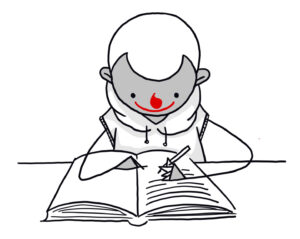
Question: How should we live?
We have the capacity to be the authors of our own stories and can refrain from allowing others to dictate how we ought to live. We are conscious creatures who can deliberate between options, imagine alternatives, make choices over how we act, reflect on those choices, and learn from each other’s experiences. We are also creative, and we can delight in the creativity of others. Through music and song, painting and stories, dance and drama, cooking and comedy, the arts can enrich our lives, help us to make sense of our situation, and connect us to each other. Our creativity can also be the source of solutions to the many challenges we face. Humanists believe that these freedoms enable us to give meaning and shape to our lives and to find happiness in the here and now.
‘As a humanist, I think there’s no inherent meaning to the universe… But that’s not the end of that statement or that conversation. We can create meaning and order and structure and beauty and art… It’s a declaration of autonomy. If we want to have beauty and structure and meaning in our lives then we have to provide it.’
Frank Turner, musician and patron of Humanists UK
For humanists, all these capacities are natural. They are, of course, not the only capacities we have. Other humanists may wish to highlight the importance of other shared talents or abilities. We also have many negative instincts, habits, and behaviours. We do not always use our capacities well. We can be irrational, unempathetic, and we can make bad choices. Often these failures to live up to our potential are a consequence of the conditions in which we find ourselves. Humanists, then, ask how we can make the best use of our positive capacities, and build a world that allows others to do the same.
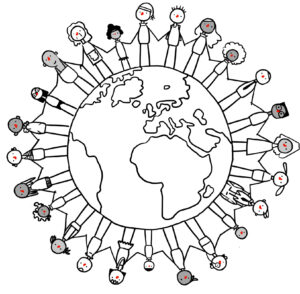
Question: What kind of world do we want?
‘Humanism is a way of thinking and living that emphasises the agency of human beings. Humanism stresses the fact that we, human beings, are capable of changing the world. That we have the power to make a difference in our lives, both individually and collectively, without recourse to some outside force.’
Leo Igwe, Founder of Nigerian Humanists and board member of Humanists International
‘Being a humanist empowers me to live a meaningful life, to take a stand against inequality and injustices, and to create a better world for future generations.
Maachelle Farley, Humanists Barbados
What motivates humanists to live the way they do? What lies behind their aspirations and goals? What ambitions do they have for society? Often they claim our capacities place on us a responsibility to try to build a world in which everyone has the opportunity for their positive capabilities to flourish in the one life they have.
Perhaps this is what the Happy Human is reaching for? Remaining grounded but reaching high – the challenge at the heart of the humanist ambition.
Humanists recognise that human beings are capable of great harm to ourselves, to each other, and to the planet. A better world is not guaranteed. However, they will typically be cautiously optimistic about our human potential. That’s not a naïve optimism that things are guaranteed to get better. It’s an optimism that recognises that what we do can make a difference. That motivates humanists to take action – help isn’t going to come from outside humanity. Over human history we have made great progress towards a better and fairer society. We can celebrate our achievements while recognising the work that is still to be done and understanding that progress is not a given. For humanists a better world is merely possible. It is up to us to build it.
Teachers, if you are interested in using this approach to introduce humanism, you’ll find our new animation and accompanying resources here.

Humanists UK
39 Moreland Street
London EC1V 8BB
education@humanists.uk
@HumanismEdu

© Humanists UK 2025. Registered Charity No. 285987
humanists.uk | Privacy
Illustrations by Hyebin Lee